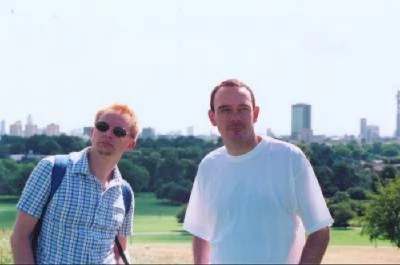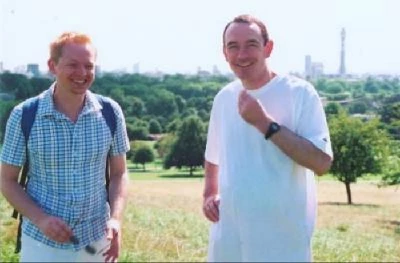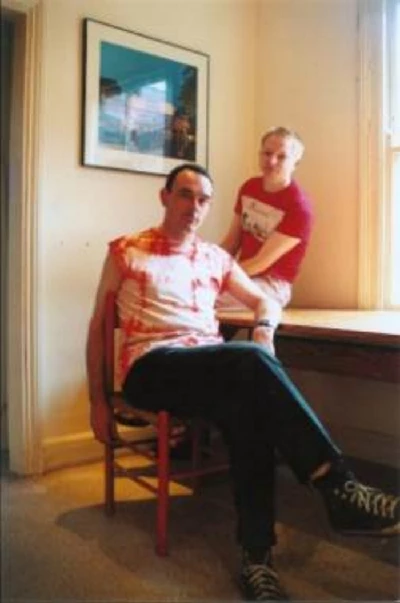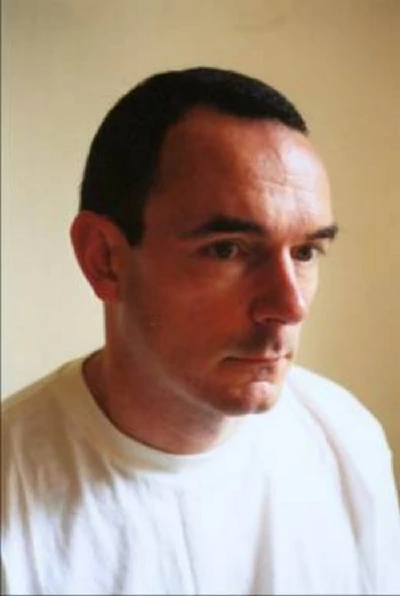Friends
-
Interview Part 1
published: 19 /
8 /
2003
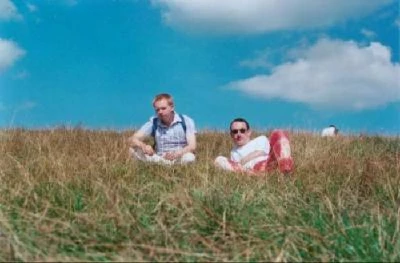
Legendary British indiepop group Friends have recorded 7 albums since 1988. In the first of a two part interview to be concluded next month frontman William Jones talks to Tommy Gunnarson about the band's long musical history
Article
It's early May and Gothenburg is showing it's better side, with the sun shining from a clear blue sky. I am here to meet up with William Jones, the main man behind the legendary British indiepopsters Friends, who since 1988 have recorded 7 albums We meet outside the grand central station, and decide to sit down at a café inside the train station and have a chat. An hour later, we wave goodbye, and this is what was said during those 60 minutes...
PB : What kind of music did you grow up listening to?
WJ : I grew up listening to the Beatles. And groups from the classic era of pop, like the Rolling Stones and the Kinks. And classical music. When I was very young I learned the classical guitar.
PB : So, you’re a trained musician ?
WJ : Yeah. I went on to study music at university. And I have always loved pop music. Or any sort of music. But I particularly remember the Beatles. They were very exciting when they were new. It was a completely different sound from anything anyone had ever heard.
PB : When did you start playing music?
WJ : I began playing the guitar when I was 7. I had a very good guitar teacher, who used to come around to the junior school where I grew up in London, and for some reason I had a particular ability. So he suggested that I should start to have private lessons, and I got quite good. I also learned the piano privately and played violin at school in the orchestra. And I just got very serious about the guitar. There was something about the feel of it and the sound if it that I liked. In my teens my ambition was to become a classical guitarist.
PB : But you didn’t ?
WJ : I didn’t. I got more interested eventually in writing music and I got more interested in classical music generally rather than guitar music. The repertoire for classical guitar is not so great. I, therefore, got more interested in composition and eventually also music analysis and history. So I decided to study music at university. I don't think that I would have been good enough to be a top classical guitarist. It’s very competitive. There are two or three brilliant ones. And you need to be the two or three best. And I’m quite happy with that.
PB : Are you trained as a studio technician too ?
WJ : No.
PB : Do you record your records by yourself in Friends?
WJ : Well, we work with a producer, John Spence, who has produced our last four albums. We go to a studio in Hull where he likes to work. The first three albums I produced, and I was kind of reasonably happy with them. But my technical knowledge was limited. John produced the single 'Far & Away' in our early days, so we went back to him to produce 'Bluishness', which was the first album he produced and which came out in 1992. During my teens I listened to pop music, and especially to acts like the Strawbs and Nick Drake, who were kind of folky. I loved an American band called Steely Dan. And then when punk came along I got very keen on that. I went to see bands like the Buzzcocks a lot, and out of that I got very fond of Orange Juice. And that’s when I started wanting to be in a band myself.
PB : When did you form your first band?
WJ : In 1986.
PB : Was that Friends?
WJ : Friends is my first and only band, yes. I had been playing with a colleague on the Summerhouse label, called Carl Green. We had a band called Whirl Pool Guesthouse, and before they got serious and started releasing records, they were more of a rehearsing band. Then I joined on guitar just for fun, and then I started writing songs. But we decided that the band wouldn’t use my songs. They would use Carl’s songs. So we split in two. It was very friendly, but we decided to be two bands. We were working with a trumpeter at the time, and the trumpeter went with me, and the other stayed with Carl and became Whirlpool Guesthouse.
At the time, I was the songwriter and guitarist. I wasn’t going to be the singer. We always thought we would try to find a singer. We never did find one, and at the same time I started to enjoy the singing, a lot. So I remained the singer.
PB : How did Friends come about? How did you form?
WJ : Well, I got these songs and we did an early demo tape of five of them, with me playing all the instruments and Carl Green singing. And then I became the singer, and I asked some friends of mine, that were all playing in other bands, if they would like to join.
At the time, I was living in a town in the north of England, called Stockton-on-Tees and there was a very good band scene. Most people played in two or three bands at the same time. Some of them were doing it to get a contract with a major record label, and others did it because they were good songwriters and they wanted to get their music heard.
The early line-up didn’t stay were long. There were always people leaving and joining. Eventually, myself and the keyboard-player and the trumpeter, who was called Stuart, decided to rationalize it, so we made the band us two and just used other people on a session basis. We developed the songs, made the demos, and when we were going to record, we rehearsed with them, and paid them a small fee, and toured with them… But it was all on a session basis. We were the band.
PB : And it still is?
WJ : No. That worked quite well for a while. Then Stuart moved away to university and left the band. At the same time I moved away from Stockton-on-Tees after eight years and I met Martin Parker, who is now the other half of the band. He’s the drummer and works on the arrangement on the songs with me. So now it’s just us two. We're the band, and we perform together acoustically, as Martin plays percussion as well, and the rest of the band is once again people who we just work with for the album and for the tour. And not full-time, as they are all doing other things too. What is happening now is that we are working with a group of people that we have worked with since the early 90’s, which is a very long time. And the next album we will be recording this autumn will be with the same people as the last one.
PB : So, Friends is just a duo?
WJ : Yeah.
PB : What were your influences at the very beginning?
WJ : I think there was a classical guitar music influence. On the early songs, the guitar parts I used to play were quite intricate. Quite classical, with a lot of picking.
And also, at the time I was writing a lot of systems music, a kind of contemporary classical music, similar to people like Steve Reich and Terry Riley, which was very repetitive with a change in patterns. So, there was an element of that, but with tunes on top, and as we developed, there was the influence of bands like Orange Juice and the Buzzcocks. The early songs tends to be very fast.
At the same time, there was a band that I have always loved a lot, called The Chameleons, who influenced a lot of people, like Oasis and the Stone Roses. They just reformed a few years ago actually. A great band, and are probably the best band I’ve ever seen playing live. And in some of our less poppy songs, they are also an influence. And then there’s also an influence of various bands from the 70’s that I used to love, like Renaissance, who had a very acoustic sound. We have always used acoustic guitars quite a lot. And then obviously the Teardrop Explodes, because of their trumpet sound and the fact that they are very English. We often get compared with them. So, I guess they are our main influences, and all also fairly obvious ones.
PB : Have they changed ?
WJ : Yeah… But I don’t listen to a lot of pop music now, so I couldn’t say what may have influenced us. It may be a song that I just heard on the radio or on a record. But I think the influences are in general are the same. I just think we have developed it more and have become more varied than in the early days.
PB : What influences your lyric writing?
WJ : Well, lyrically… I think in pop music, in the more darker songs, bands like the Chameleons again, whose music is very intense and sad. They're not depressive, but it’s a big strength about it. And, I don’t know if it’s true, but I have always very intrigued by the lyrics of Steely Dan. I try to be very economical lyrically as a result. I try to say things in as few words as possible. And although they have a lot of names of places, persons etc in their songs, which we don’t, I think some of the more quirky elements of our songs are influenced by that. I try to acknowledge it our songs. There’s a song on out 1995 album 'Folk Songs' called 'Nikky Don’t Cry', and Steely Dan had a song called “Ricky, Don’t Lose That Number'. I tried not so much as copy it as make a reference to it.
PB : Have you ever tried to be political in your lyrics, or are you not interested in that ?
WJ : Not political in the sense of British politics. There’s a few songs that are political in the social sense. There’s an early Friends song called 'Burning Bridges'… sometimes when you write lyrics you don’t know if what you had in mind comes across. But in my mind, it’s set around the First World War and has people coming back from that awful carnage to a land that was supposed to be better, but actually turned out to be worse.
It’s a reference to my grandfather, who had been through all that in the Second World War. At the time I was writing that, in the 80’s, England was a very depressing, bleak place to be. Unemployment was very high, and there was enormous poverty between rich and poor… it was just an awful place to be. People who had been through two world wars ended up with that.
Other than that, they’re not very political. They are very personal and I suppose a bit selfish and largely about myself.
The last time I tried to write my lyrics differently. I tried to say what I was saying a lot clearer. Because sometimes when you write a song and listen to it five years later, you think “what on Earth was I trying to say here” On the last album, before I wrote the lyrics, I wrote down in narrative form what the song was about. What were the situation, who were the people and what was the intention? It worked well for me.
The second part of this interview will be featured in next month's Pennyblackmusic magazine
Picture Gallery:-
